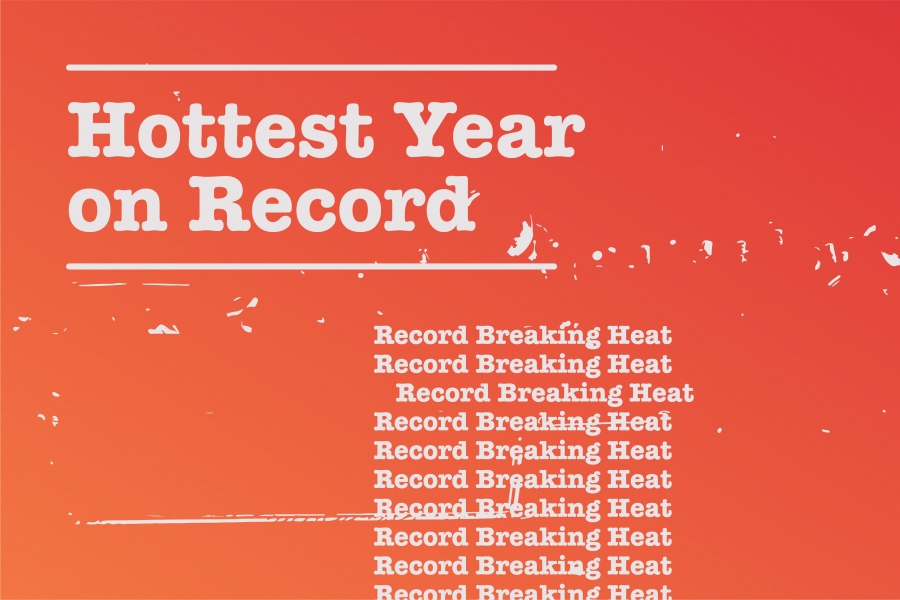
Headlines about “record-breaking” temperatures dissuade readers from addressing the issue properly
 Once, my father and I took a walk around the edge of Lake Tahoe. It was early April — the start of spring — but the weather was fair for that time of the year. Even the surrounding peaks were stark, devoid of the snow caps that would typically be present throughout April and into May. Waves lapped invitingly at the shore, pushing against small puddles of melting ice scattered sporadically along the beach.
Once, my father and I took a walk around the edge of Lake Tahoe. It was early April — the start of spring — but the weather was fair for that time of the year. Even the surrounding peaks were stark, devoid of the snow caps that would typically be present throughout April and into May. Waves lapped invitingly at the shore, pushing against small puddles of melting ice scattered sporadically along the beach.
“Did you know,” my father said as we kicked around the remaining slush that was tinged dirt-brown by the sand, “that this year was the hottest on record?”
We continued on in resigned silence, the words falling flatly in the dead air as I tried to wrap my head around the implication of my father’s statement.
Now, three years later, I still can’t fathom what exactly that phrase means to me. Understanding “record-high” is difficult when I’ve only experienced 20 other winters.
News’ greatest nemesis has always been science — littered with emotionless facts, nothing fails to grasp the attention of the public more than a bland scientific report. As such, news outlets have always struggled to put a human face to science. In some cases, though usually rare, attempts have been fruitful — look at Rachel Carson’s “A Silent Spring,” which eventually led to a nationwide ban on specific agricultural pesticides.
Now, however, we have found media’s true Achilles heel: climate change coverage.
It’s not my father’s fault for regurgitating some headline or another that he’d read earlier in the day, not when most articles contain flashy headlines along the lines of “Arctic Sea Ice Missed a Record Low. Barely.” or “More of the Bay Area Could Be Underwater in 2100 Than Previously Expected.” In fact, this problem spans across all outlets, from the New York Times (re: the first two articles mentioned) to The Washington Post (“Unusual, record-breaking April cold to crash into eastern U.S. Friday through the weekend”) to USA Today (“Global warming is causing an Alaskan glacier to melt at the fastest pace in 400 years”).
Such headlines are not attention-grabbing — but rather the opposite. Extraordinarily vague and containing at least one massive guilt-trip, articles that fall into this category leave their readers less inclined to discuss global warming because nobody wants to invest their time in reading about grim issues. Instead of encouraging the necessary conversation that would inspire further introspection, these headlines leave little dent on the day-to-day lives of individual readers. How many people care about what happens to an Alaskan glacier in 400 years when they have their own pressing personal troubles now?
What do I do when I hear that California’s annual fire season was two months longer despite record rainfall the previous winter? Like my father, I turn my back on the topic and refuse to listen to the damning information.
A worse consequence of writing about global warming in this manner, however, is the total public desensitization toward the subject.
Announcing 2016 as the hottest year on record — when the same was said for 2015 and 2014 — gradually loses impact on readers when we only expect the upward trend to continue the following year. Yes, this information is newsworthy at the time of its publication; yes, it’s also necessary that the public should have access to this information. But, as with the topic of climate change as a whole, the media’s addiction to hyperbole and sensationalism distances the audience from the issue and only further strengthens our desire to remove ourselves from the problem.
While we are constantly discovering more about the rate and effects of global warming, our treatment of it in the news needs to evolve as well.
I cannot speak to how to incentivize public action. Instead, let me offer a solution that would capture my attention if I were perusing the subject:
Global warming is at our doorstep, knocking. If we continue to treat it as a fearful thing, people will be inclined to hide and ignore the problem until it goes away. On the other hand, if we include personal success stories about individual or community attempts to slow climate change, readers might be more inclined to listen.
So, journalists take note: Records mean nothing if they exist only to be broken.
Written by: Erin Hamilton — elhamilton@ucdavis.edu
Disclaimer: The views and opinions expressed by individual columnists belong to the columnists alone and do not necessarily indicate the views and opinions held by The California Aggie.



